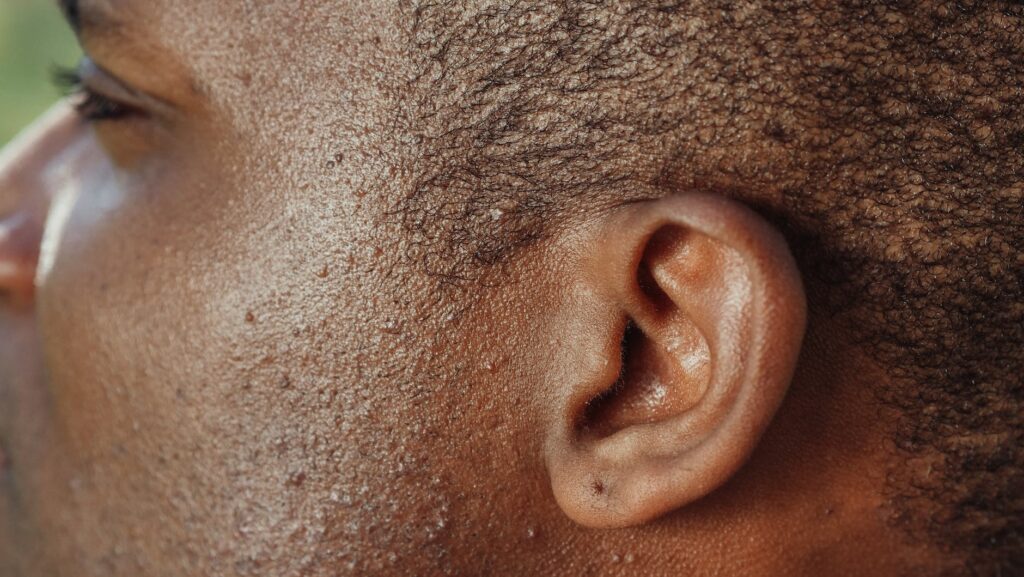
Photo by Kindel Media on <a href="https://www.pexels.com/photo/man-s-ear-in-close-up-photography-7298464/" rel="nofollow">Pexels.com</a>
Hearing loss is a prevalent condition that affects millions of people worldwide. Fortunately, technological advancements have led to the development of hearing aids, which are highly effective in improving the quality of life for individuals with hearing loss.
These small electronic devices offer numerous benefits in enhancing hearing abilities and facilitating better communication.
However, it is important to understand that hearing aids also have certain limitations that should be considered.
This article will explore the benefits and limitations of hearing aids, shedding light on their positive impact while acknowledging the potential challenges they present.
Benefits Of Hearing Aids
Improved Speech Understanding
According to a study published in the International Journal of Audiology, hearing aids significantly enhance speech perception and understanding, particularly in noisy environments. They amplify the desired sounds while reducing background noise, allowing individuals to follow conversations more effectively.
Enhanced Social Engagement
Research by the National Council on Aging revealed that hearing aid users experience improved emotional and social well-being. They are more likely to participate in social activities, maintain relationships, and confidently engage in conversations.
Better Cognitive Function
Studies have shown a link between untreated hearing loss and cognitive decline. However, wearing hearing aids can potentially mitigate this decline. A study published in the Journal of the American Geriatrics Society found that hearing aid use was associated with a lower risk of cognitive decline and dementia in older adults.
Increased Safety And Awareness
Hearing aids help individuals with hearing loss stay safe by enabling them to detect important sounds in their environment, such as sirens, alarms, or approaching vehicles. This can be particularly crucial in outdoor settings or when crossing roads.
Limitations Of Hearing Aids
High Cost
The cost of hearing aids can be a significant barrier for many individuals. According to the Hearing Loss Association of America, the average hearing aid cost can range from $1,500 to $3,500 per ear, making them unaffordable for some people. Insurance coverage and financial assistance programs may help mitigate this limitation.
Variable Performance In Noisy Environments
While hearing aids have advanced noise reduction features, they may not completely eliminate background noise in all situations. Users may still find it challenging to hear conversations clearly in noisy environments like crowded restaurants or social gatherings.
Adjusting To Amplified Sounds
It takes time for new users to adapt to the amplified sounds provided by hearing aids. Initially, sounds may appear loud or unnatural, and the brain needs adjustment to process the enhanced auditory input effectively.
Dependence On Batteries
Most hearing aids rely on disposable or rechargeable batteries for power. Users must ensure they have an adequate supply of batteries or remember to recharge them regularly to avoid interruptions in hearing aid usage.
How Can A Professional Help?
A professional, such as an audiologist or a hearing care specialist, is crucial in helping individuals with hearing loss.
Here’s how they can assist:
- Diagnosis And Assessment: Professionals are trained to conduct comprehensive hearing evaluations to diagnose the type and degree of hearing loss. They use various tests and measurements to assess the individual’s hearing abilities, identify any underlying causes of hearing loss, and determine if hearing aids are appropriate.
- Customized Treatment Plan: Based on the assessment results, professionals develop personalized treatment plans tailored to the individual’s needs and preferences. They consider factors such as the degree of hearing loss, communication requirements, lifestyle, and budget.
- Hearing Aid Selection And Fitting: Professionals have in-depth knowledge of the different types and models of hearing aids available in the market. They help individuals select the most suitable hearing aid based on factors like the severity of hearing loss, lifestyle demands, and cosmetic preferences. They also ensure the chosen hearing aids are properly fitted and programmed to meet the individual’s unique hearing needs.
- Counseling And Education: Hearing care professionals provide counseling and education to individuals with hearing loss and their families. They explain the nature of hearing loss, the benefits and limitations of hearing aids, and realistic expectations. They also guide hearing aid usage, maintenance, and troubleshooting, helping individuals make the most of their hearing aids.
- Follow-up Care And Adjustments: Professionals offer ongoing support and follow-up care to monitor the effectiveness of the hearing aids and make necessary adjustments. They may fine-tune the hearing aid settings based on the individual’s feedback, address any concerns or issues, and ensure that the devices continue to meet the changing hearing needs of the individual.
In addition to hearing aids, professionals can recommend and provide assistive listening devices to enhance communication abilities in specific situations. These devices include FM systems, captioned telephones, and Bluetooth accessories for connectivity with televisions, phones, and other audio sources. To learn more, visit cart translation services.
In conclusion, hearing care professionals play a vital role in diagnosing, treating, and supporting individuals with hearing loss. They offer specialized expertise, guidance, and ongoing care to ensure that individuals receive the most appropriate and effective solutions to improve their hearing abilities and overall quality of life.
When You Need A Hearing Aid?
You may need a hearing aid when you experience difficulties with hearing that impact your daily life and communication abilities. If you find yourself struggling to understand conversations, frequently asking others to repeat themselves, or experiencing challenges hearing certain sounds, it could indicate that you need a hearing aid.












